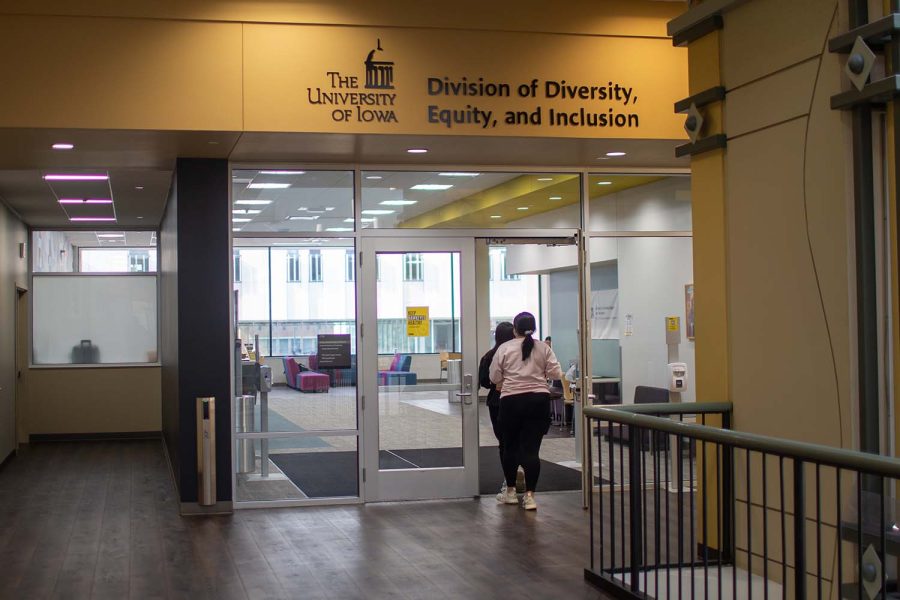Some UI faculty feel DEI has too much emphasis
The 2022 University of Iowa Campus Climate survey found decreasing trends of satisfaction with the UI’s approach to diversity, equity, and inclusion initiatives.
The University of Iowa Division of Diversity, Equity, and Inclusion offices on Thursday, Feb 3, 2022.
February 19, 2023
Some University of Iowa faculty are dissatisfied with the way the university is handling diversity, equity, and inclusion efforts.
In two questions on the 2022 UI Campus Climate survey, 27 percent of faculty and staff agreed that attention to DEI distracts from academic goals and achieving the university’s mission. Additionally, 36 percent said there is too much emphasis put on DEI issues.
The 2022 UI Campus Climate Survey, an online survey that is conducted every two years, is sent to students and staff in the spring semester.
Overall, 83 percent, or 4,731 faculty and staff members, responded that DEI is important to them.
Elizabeth Tovar, UI Division of Diversity, Equity, and Inclusion executive officer and associate vice president, said the 2022 survey’s results were consistent with past surveys.
In 2018, the survey found 86 percent of responders generally agreed that the UI overall had a strong commitment to DEI. Seventy-five percent of faculty, 89 percent of staff, and 87 percent of professional students also agreed that the UI is committed to DEI initiatives.
Tovar said the survey gives campus leaders areas to focus on, such as faculty, staff, and employee retention.
“We also know that one of the top three answers that people give [for leaving] has to do with workplace culture,” Tovar said.
Tovar said the UI defines DEI in the broadest terms possible to emphasize inclusivity and belonging. DEI is not only about race or gender, but also accessibility and providing students the tools they need to be successful, she said.
“The vast majority of individuals who hold Ph.D.’s in STEM fields are white, and then a very small percentage of them come from underrepresented populations,” Tovar said. “So, we need to make sure that we do a better job of recruiting individuals who want to go into those fields and helping them get jobs in those fields.”
Tovar said DEI initiatives can be hard to tackle because it revolves around people’s thoughts, feelings, and belief systems, and the UI does not want to change those systems for people.
RELATED: UI DEI committee identifies retention, belonging as obstacles for CLAS members
Loren Glass, UI English department chair, said he has not seen any aggression toward DEI initiatives but rather passive resistance.
In 2020, Glass set up a committee called Ideas for Inclusion, Diversity, and Equity Access and Social Justice in response to student demands. Glass said it was the first standing committee in the English department to include undergraduate and graduate students and staff.
“We had some concerns from students of color and allied students — both undergrads and graduate students — about a number of issues regarding the culture and climate of the English department,” Glass said.
Glass said because the committee was voluntary, there were some faculty who didn’t want to participate.
“I think some folks think they’re already ‘woke’ and have already done what they need to do and don’t need a committee to tell them what to do,” Glass said. “There are some people who associate that kind of work with the kind of corporate diversity culture, you know the kind of ‘Disneyfication’ of diversity, and so they don’t like that either.”
Glass said some students are busy with their own lives and are not aware of how much the issue of diversity at the UI needs to be addressed.
Infographic by Jami Martin-Trainor/The Daily Iowan
“I will say that the most important thing though really is recruitment and retention of faculty, staff, and students of color, to make sure that we don’t have a tokenism situation,” Glass said. “I don’t want to have one representative faculty of color. I want to have a community of people of color.”
Sarah Vigmostad, interim associate dean for Diversity, Equity, and Inclusion for the College of Engineering, said faculty reactions to DEI have been positive.
“I would say that our faculty are very supportive and enthusiastic about sort of using research-backed best practices to advance DEI to foster an inclusive classroom environment,” Vigmostad said.
For faculty engagement in DEI, Vigmostad said the College of Engineering has been focusing on classroom practices and policies for inclusion and including discussions on social responsibility in the curriculum.
“Engineering, even though it’s a very technical field, it also is a field that has a direct impact on society,” she said. “And so, recognizing and integrating those discussions, I think there’s opportunities where we can be doing that better.”















